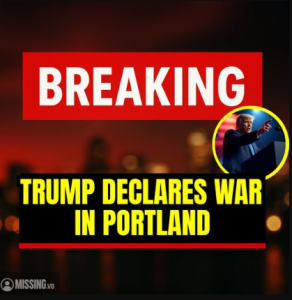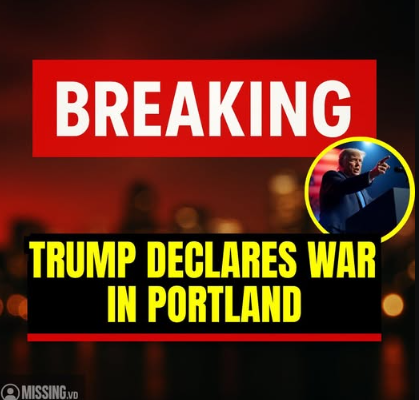🕊️ A City in the Crosshairs: Portland, Protest, and the Language of War
In early September 2025, President Donald Trump made headlines with a series of provocative statements suggesting that Portland, Oregon, could be the next city to face federal intervention. His remarks—delivered during a press briefing and amplified on social media—were framed in militaristic language, invoking images of destruction, chaos, and the need for force. “We’re going to wipe ’em out,” he said, referring to protesters in Portland. “They’ve ruined that city. It’s like living in hell.”
The comments followed a pattern: similar threats had already been made toward Chicago, Washington, D.C., and Los Angeles, where National Guard troops had been deployed in response to crime and immigration protests. But Portland’s inclusion in this list struck a particular chord. It wasn’t just about law enforcement—it was about symbolism.
🔥 The Spark: A Misleading Image and a Misguided Response
Trump’s decision to target Portland was reportedly influenced by a television segment that aired footage from the 2020 George Floyd protests, mistakenly presented as current events. The clip showed dramatic scenes of unrest, including a viral moment where a protester was pepper-sprayed by federal agents. Trump, believing the footage to be recent, declared Portland a “burning city” and suggested immediate action was necessary.
This misperception—mistaking old footage for new—underscores a deeper issue: the power of media to shape political response, and the fragility of truth in the age of spectacle. Portland, in reality, had seen only small-scale demonstrations near an ICE facility. But the image Trump saw became the reality he acted upon.
🛡️ The Language of War: A Shift in Tone
Perhaps most striking was Trump’s decision to rename the Department of Defense as the “Department of War” through an executive order. While largely symbolic and requiring congressional approval, the gesture was loaded with meaning. It signaled a shift—from defense to aggression, from protection to domination.
This rebranding was accompanied by a parody image from Apocalypse Now, posted on Trump’s Truth Social account, featuring helicopters over a flaming skyline and the caption: “I love the smell of deportations in the morning”. The reference to napalm, war, and cinematic violence was not subtle. It was a deliberate invocation of fear, control, and spectacle.
For many, this was not just political theater—it was a threat. Oregon’s Attorney General and Portland’s Mayor both issued statements condemning the remarks and warning of legal action if federal troops were deployed.
🌿 Portland’s Legacy of Resistance
Portland is no stranger to protest. The city has long been a hub for progressive activism, environmental advocacy, and civil disobedience. From anti-war marches to Black Lives Matter demonstrations, Portland’s streets have borne witness to the rituals of resistance.
To threaten Portland with military force is to threaten a tradition of civic engagement. It is not just about controlling crime—it is about silencing dissent.
And yet, Portland’s response has been measured. Mayor Keith Wilson stated that the city does not need federal intervention, and local leaders have emphasized the importance of community-led solutions. Their stance reflects a quiet conviction: that healing cannot be imposed from above, and that dignity must be defended from within.
🧵 Threads of Meaning: What Does “War” Really Mean?
When a president uses the word “war” to describe domestic policy, it carries emotional weight. War is not just a military term—it is a metaphor for conflict, control, and consequence. To declare war on a city is to declare war on its people, its values, and its rhythms.
32.Phirun, your appreciation for emotional resonance and the transformation of ordinary events into sources of meaning invites us to look deeper. What does it mean to “declare war” on Portland?
It means turning a city into a symbol. It means reducing complexity to caricature. It means replacing dialogue with domination.
But it also means revealing something about ourselves—about how we respond to fear, how we protect our communities, and how we reclaim our narratives.
📣 The Public Response: Protest as Ritual
In cities like Chicago and Los Angeles, Trump’s threats have already sparked protests. Signs reading “I.C.E. out of everywhere” and “We won’t be intimidated” have filled the streets. In Portland, similar demonstrations are expected. These are not just political acts—they are rituals of resistance.
Protest, in this context, becomes a form of storytelling. It is a way for communities to say: We are here. We are not afraid. We will not be erased.
And in that storytelling, there is healing. There is legacy. There is the quiet power of conviction.
🕯️ A Closing Reflection
The phrase “Trump declares war in Portland” may be hyperbolic. No formal military action has been taken. But the emotional truth behind the statement is real. It reflects a moment of tension—between authority and autonomy, between spectacle and substance, between fear and hope.
Portland, like many cities, stands at a crossroads. It can be defined by the threats made against it, or by the resilience it shows in response.
And in that choice, there is meaning.


